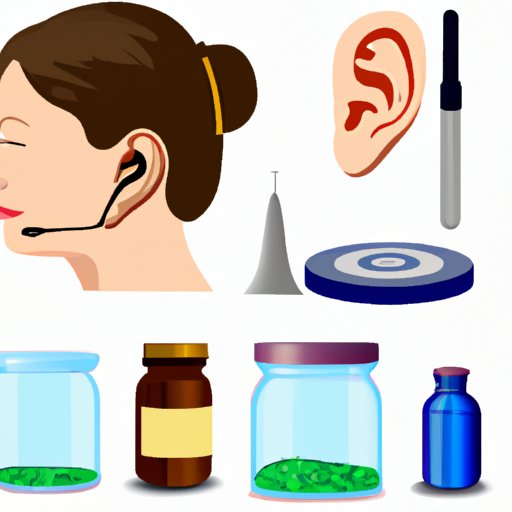I. Introduction
If you’re one of the millions of people who suffer from tinnitus, you know how frustrating and debilitating it can be. Tinnitus is the perception of sound in the ears or head that is not coming from an external source, and it can range from a mild annoyance to a constant and distressing condition. Fortunately, there are lifestyle changes and remedies that can help reduce the ringing and improve your quality of life. In this article, we’ll explore some of the most effective ways to stop ringing in ears and provide hope for those struggling with tinnitus.
II. Lifestyle Changes
There are several lifestyle changes that can help reduce tinnitus symptoms:
Avoid Loud Noises and Use Ear Protection: Exposure to loud noises can cause or worsen tinnitus. If you work in a noisy environment or attend concerts or sporting events, consider using earplugs or earmuffs to protect your ears.
Limit Caffeine and Alcohol: Caffeine and alcohol can both increase blood pressure and worsen tinnitus symptoms. Try reducing your intake of coffee, tea, soda, and alcoholic beverages.
Relaxation Techniques and Stress Reduction: Stress can exacerbate tinnitus, so finding ways to relax and manage stress can be helpful. Try meditation, yoga, or deep breathing exercises to reduce anxiety and promote relaxation.
III. Using Sound Therapy
Sound therapy is a common treatment for tinnitus that involves listening to sounds that mask or distract from the sound of tinnitus:
White Noise: White noise is a type of sound that includes all frequencies in the same intensity. It can be generated by various devices such as sound machines, phone apps or fans and can be effective in masking tinnitus.
Ocean Waves: The sound of ocean waves crashing on the shore can be soothing and help mask tinnitus. Many sound machines and phone apps feature this type of sound.
Forest Sounds: The sound of a forest is calming, and it may also help distract from tinnitus. This type of sound is also available on many sound machines and phone apps.
To use sound therapy effectively, listen to the sounds at a comfortable volume for as long as desired. Soft background music can also help and do a great job at distracting the brain from the tinnitus
IV. Using Herbal Remedies
There are several herbal remedies that may help reduce tinnitus symptoms:
Ginkgo Biloba: This popular herb is known to improve blood circulation, which can help reduce tinnitus symptoms caused by poor circulation.
Black Cohosh: This herb has antioxidant and anti-inflammatory properties that can help reduce inflammation in the ear and reduce tinnitus symptoms.
Ginger: Ginger has anti-inflammatory properties that can help reduce tinnitus symptoms caused by inflammation in the ear.
It’s important to talk to your doctor before trying any herbal remedies, as they may interact with other medications or have side effects.
V. Using Essential Oils
Essential oils can help reduce stress and promote relaxation, which can be helpful for managing tinnitus symptoms:
Lavender: Lavender oil is calming and can help reduce stress and anxiety.
Peppermint: Peppermint oil has a cooling effect and can help reduce tension headaches and muscle tension.
Cypress: Cypress oil has a calming effect and can help reduce anxiety and stress.
Essential oils can be used in a diffuser, applied topically or dabbed under the nose but they should be used properly and according to the instructions on the labels.
VI. Massage and Acupuncture
Massage and acupuncture can be helpful for managing tinnitus symptoms:
Massage Therapy: Massage can help increase circulation and reduce tension in the muscles. This increased circulation can help reduce tinnitus symptoms.
Acupuncture: Acupuncture involves the insertion of tiny needles into specific points on the body. This practice is believed to help reduce stress and promote relaxation and can be beneficial in reducing tinnitus symptoms.
It’s important to consult a trained professional before trying either of these therapies.
VII. Using Over-The-Counter Drugs
There are several over-the-counter drugs that can provide relief from tinnitus symptoms:
Antihistamines: Antihistamines can help reduce tinnitus symptoms caused by allergies or congestion.
Anti-Anxiety Drugs: Anti-anxiety drugs can help reduce anxiety and stress, which are common triggers for tinnitus.
Muscle relaxants: Muscle relaxants can help reduce tension in the muscles, which can help reduce tinnitus symptoms.
As with any medication, it’s important to talk to your doctor before taking any over-the-counter drugs.
VIII. Using Hearing Aids and Cochlear Implants
Hearing aids and cochlear implants can be helpful in reducing tinnitus symptoms by helping the patient hear external sounds that can reduce the perceived volume of the tinnitus.
Hearing Aids: Hearing aids work by amplifying external sounds, which can reduce the severity of tinnitus in some patients.
Cochlear Implants: Cochlear implants are used to stimulate the auditory nerve directly and provide hearing sensations while reducing the perceived volume of tinnitus.
Hearing aids and cochlear implants can significantly improve the quality of life of people with tinnitus and hearing loss, but not all people are good candidate for these devices.
IX. Conclusion
Living with tinnitus can be challenging, but there are many lifestyle changes and remedies that can help reduce symptoms and improve quality of life. From sound therapy to herbal remedies to hearing aids and cochlear implants, there are many options for managing tinnitus. It’s important to consult with a doctor to determine which treatments may be best for you. With the right combination of therapies, it is possible to reduce the ringing in your ears and enjoy a better quality of life without the constant annoyance of tinnitus.
